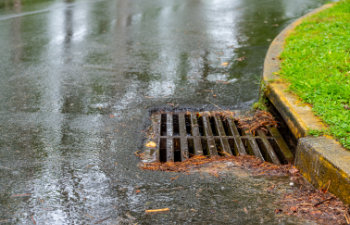
Your septic system plays a critical role in maintaining the health and functionality of your home, but proper care extends beyond regular pumping and maintenance. One of the most common mistakes homeowners make is parking vehicles on their drainfield, which can lead to serious damage and costly repairs. At Metro Septic in Cartersville, we emphasize the importance of protecting your drainfield to ensure your septic system operates efficiently for years to come.
Let’s explore why parking on your drainfield is a bad idea and how it can affect your septic system’s health.
Understanding Your Septic Drainfield
Before diving into the dangers of parking on your drainfield, it’s essential to understand what the drainfield (also known as the leach field) does. The drainfield is an underground area where the liquid waste (effluent) from your septic tank is released and filtered into the soil. The soil naturally absorbs and treats the waste, breaking down harmful bacteria and pathogens.
The drainfield is a delicate and vital part of your septic system. Any damage to this area can affect the system’s ability to filter waste, leading to backups, foul odors, and even environmental contamination.
Why Cars on Your Drainfield is a Big No-No
While the drainfield might look like an open space perfect for parking, it’s not designed to withstand the weight of vehicles. Here’s why parking on your drainfield can be problematic:
1. Compacted Soil Reduces Absorption
When you park a vehicle on your drainfield, the weight of the car can compact the soil, making it difficult for the effluent to percolate through the ground. This compacted soil reduces the drainfield’s ability to absorb liquid waste properly. Over time, this can lead to saturation of the drainfield, where the liquid has nowhere to go, resulting in wastewater pooling on the surface.
2. Crushed Drainage Pipes
The pipes beneath your drainfield are designed to distribute wastewater evenly throughout the area. However, these pipes are not built to withstand heavy pressure. When you park on the drainfield, the weight of the vehicle can crush or damage the pipes, leading to leaks or blockages that require expensive repairs or even full drainfield replacement.
According to the Environmental Protection Agency (EPA), maintaining a healthy drainfield is crucial for avoiding costly failures, and preventing damage from heavy objects—like cars—is one of the key steps to take.
3. Increased Risk of System Failure
When the soil and pipes in the drainfield are compromised, it affects the entire septic system’s ability to function. A damaged drainfield can cause wastewater to back up into your home or yard, leading to unpleasant odors and potential health hazards. Septic system failures not only result in expensive repairs but can also pose serious environmental risks, as untreated wastewater can contaminate nearby groundwater.
The Cost of Repairing a Damaged Drainfield
One of the most significant risks of parking on your drainfield is the potential cost of repairs. Depending on the extent of the damage, repairing or replacing a drainfield can cost anywhere from $5,000 to $20,000, according to industry experts. If the damage is severe enough, you may even need a full septic system replacement.
In some cases, homeowners may not realize the damage has occurred until the system starts showing signs of failure, such as slow drains, gurgling sounds in plumbing, or wet patches in the yard. By the time these symptoms appear, the damage may already be extensive, requiring immediate professional intervention.
Best Practices to Protect Your Drainfield
At Metro Septic, we want to help homeowners in Cartersville avoid unnecessary damage to their septic systems. Here are some simple steps you can take to protect your drainfield:
- Avoid Heavy Traffic: In addition to not parking on the drainfield, avoid driving over it with any heavy equipment or vehicles. The weight of trucks, RVs, and even riding lawnmowers can damage the soil and pipes.
- Mark the Area: If your drainfield is located in an area that could easily be confused as a parking or driving space, consider marking the boundaries with flags, stones, or a small fence to remind yourself and others to avoid that area.
- Plant Smartly: Avoid planting deep-rooted trees or shrubs near the drainfield, as roots can grow into and damage the septic pipes. Instead, opt for shallow-rooted plants or grass to help prevent soil erosion.
- Schedule Regular Maintenance: Routine septic maintenance is key to preventing issues with your system. At Metro Septic, we recommend having your septic system inspected and pumped regularly to keep it functioning at its best.
Why Choose Metro Septic in Cartersville?
At Metro Septic, we understand the importance of protecting your septic system, and we’re here to help with expert advice and professional services. Our experienced team offers a wide range of septic services, from routine inspections and pumping to emergency repairs. We use state-of-the-art technology to diagnose and fix issues quickly and efficiently, ensuring your septic system stays in top shape.
With years of experience serving homeowners in Cartersville and the surrounding areas, Metro Septic is committed to providing quality service and personalized care. Whether you need routine maintenance or have a septic emergency, you can trust our team to deliver the best results.
Keep Your Drainfield Clear and Your Septic System Healthy
Parking on your drainfield may seem harmless, but the risks far outweigh the convenience. By avoiding heavy traffic on this crucial part of your septic system, you can prevent costly repairs and ensure your septic system continues to function smoothly.
If you have questions about protecting your drainfield or need septic services, contact Metro Septic in Cartersville today. Our team is here to help you maintain a healthy, functional septic system for years to come.

